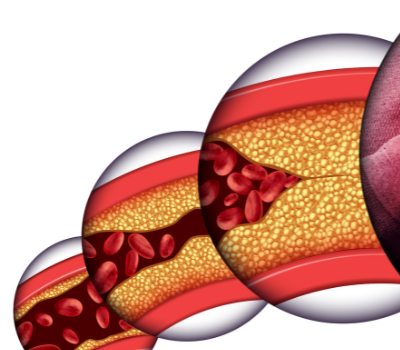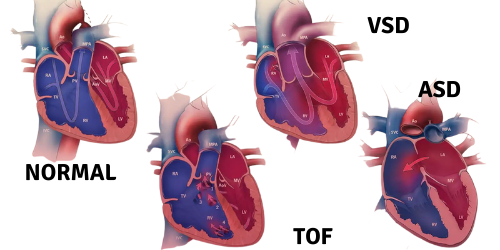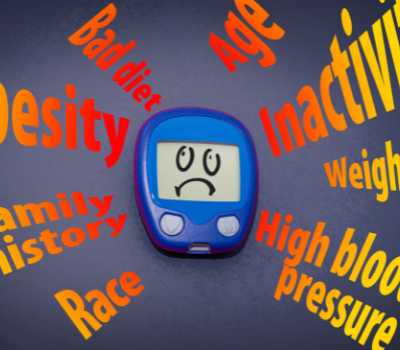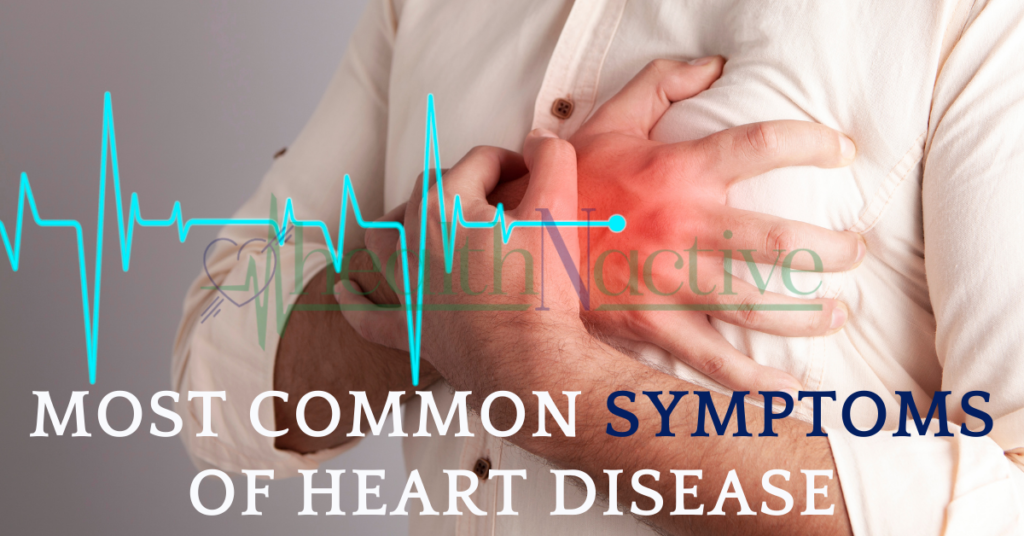A variety of illnesses that affect your heart are referred to as heart disease. The following are examples of heart diseases:
- Coronary artery disease, a type of blood vessel disease.
- Problems with heart rhythm (arrhythmias)
- Born with a cardiac defect (congenital heart defects)
- Valve disease of the heart
- Muscle disease of the heart
Many types of heart disease can be avoided or cured by adopting a healthy lifestyle.
Symptoms
The symptoms of heart disease vary depending on the type of heart disease.
Symptoms of heart disease, Related to Blood Vessel
Atherosclerosis, or the accumulation of fatty plaques in arteries, can harm blood vessels and heart. Build-up of plaque causes blood arteries to narrow or obstruct, which can result in a heart attack, chest discomfort, or stroke.

Coronary artery disease symptoms could be different based on gender. For example, male has a high chance to have chest pain. Women are more likely to get other clinical symptoms together with chest pains, including breathlessness, nausea and extreme tiredness.
Signs and symptoms
Chest pain, chest tightness, chest pressure and chest discomfort
Shortness of breath
Pain in the neck, jaw, throat, upper abdomen or back
Radiating pain from centre of chest to left-hand little finger is classical symptom
Coronary artery disease may not be discovered till a heart attack, angina, stroke, or heart problems. Regular assessments can possibly detect cardiovascular problems at an early stage.
Symptoms of heart disease, Related to Irregular Heart Beats (Arrhythmias)
Causes
- Coronary artery disease
- Diabetes
- Drug abuse
- Excessive use of alcohol or caffeine
- Congenital heart defects
- High blood pressure
- Smoking
- Some over-the-counter medications, prescription medications, dietary supplements and herbal remedies
- Valvular heart disease
Patient may feel heart is beating too fast, too slow or irregular, typical arrhythmia Signs and Symptoms include:
Fluttering on chest
Fast heartbeat (Tachycardia)
Slow heartbeat (Bradycardia)
Chest pain (Angina) or discomfort
Shortness of breath
Vomiting
Dizziness
Fainting or near fainting
Black out
Treatment: Life threatening arrhythmia need immediate medical treatment in form of Shock, Medicine. Other treatment options include Radio-frequency ablation, Pacemaker, ICD, CRT
Symptoms of heart disease, Related to Birth(Congenital)
Major heart defects that baby born with are usually noticed shortly after delivery.
Here are few listed: Tricuspid Atresia, Tetralogy of Fallot, truncus arteriosus, Transposition of great arteries, etc..

Congenital Heart defect signs and symptoms in children may include
Skin colour: blue (cyanosis)
Swelling of the legs, abdomen, or eyelids
During feedings, you may experience shortness of breath on baby,
Poor Weight gain
Congenital cardiac abnormalities that are less significant are frequently not discovered until later in childhood or adulthood.
Here are few listed: ASD, PDA, VSD, etc…
These congenital heart disease are usually not immediate life-threatening and its Symptoms and Sings include:
Quickly getting breathless during exercise or activity
Easily exhausted through physical activity or exercise
Hands, ankles, and feet swelling
Symptoms of heart disease, Related to heart Muscle (Cardiomyopathy)
Cardiomyopathy is a cardiac muscle disorder that makes it difficult for the heart to pump blood throughout the body. Heart failure can result from cardiomyopathy. Dilated, hypertrophic, and restricted cardiomyopathy are the three primary forms of cardiomyopathy.
Breathlessness with exercise or at rest
Legs, ankles, and feet are swollen.
Fatigue
Heartbeats that are irregular, hammering, or fluttering, dizziness, and fainting
Symptoms of heart disease, Related to heart Valves
During a heartbeat, healthy heart valve leaflets can fully open and close the valve, whereas diseased valves may not be able to do so. Any heart valve can deteriorate, but the aortic valve is the most usually afflicted.
Diseased valves can become “leaky” so they do fully close; this is named as regurgitation. If this occurs, blood leaks back into the chamber that it originated from and not enough blood can be pumped forward through the heart.

The other major type of heart valve disease is stenosis, which occurs when the opening of the valve is restricted and rigid, preventing the valve from fully opening while blood is trying to pass through.
Causes:
Rheumatic fever
Infections (infectious endocarditis)
Connective tissue disorders
Signs & Symptoms
Fatigue
Shortness of breath
Irregular heartbeat
Swollen feet or ankles
Chest pain
Fainting (syncope)
Risk factors
Smoking. Smokers have a higher risk of heart attacks than non-smokers.
Poor diet. A high-fat, high-salt, high-sugar, and high-cholesterol diet can all contribute to the development of heart disease.
High blood pressure. High blood pressure that is uncontrolled can cause your arteries to stiffen and thicken, narrowing the veins through which blood flows.
High cholesterol levels. Plaque development and atherosclerosis are both increased by high cholesterol levels in the blood.
Diabetes. Diabetes raises the chances of developing heart disease.
Obesity. Other heart disease risk factors are often worsened by excess weight.
Physical inactivity. Lack of exercise is linked to many types of heart disease, as well as some of the disease’s other lifestyle factors.
Poor dental health. Germs can enter bloodstream and go to your heart, producing endocarditis, if your teeth and gums aren’t healthy.

Prevention
Quit smoking.
Control other medical conditions, including hypertension, high cholesterol and diabetes.
Exercise for at least 30 minutes.
Consume a low-salt, low-saturated-fat diet.
Maintain a healthy body mass index (BMI).
Start reducing and deal with stress.
Maintain a healthy level of hygiene.

